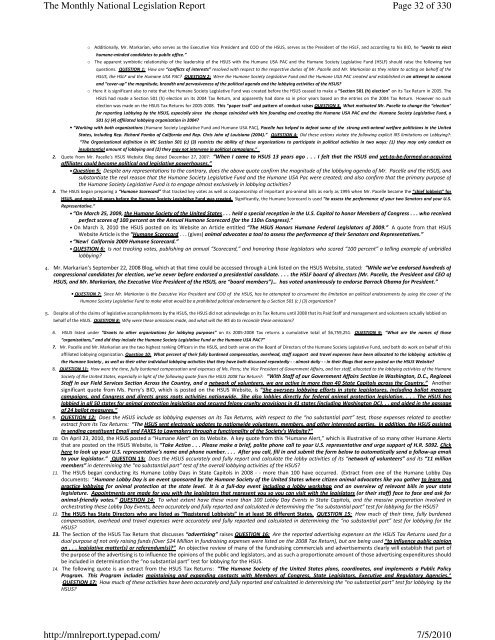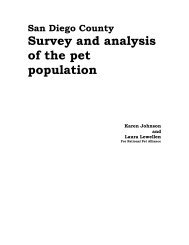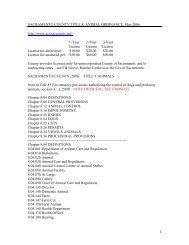Page 1 of 330 The Monthly National Legislation Report 7/5/2010 ...
Page 1 of 330 The Monthly National Legislation Report 7/5/2010 ...
Page 1 of 330 The Monthly National Legislation Report 7/5/2010 ...
You also want an ePaper? Increase the reach of your titles
YUMPU automatically turns print PDFs into web optimized ePapers that Google loves.
<strong>The</strong> <strong>Monthly</strong> <strong>National</strong> <strong>Legislation</strong> <strong>Report</strong>http://mnlreport.typepad.com/<strong>Page</strong> 32 <strong>of</strong> <strong>330</strong>7/5/<strong>2010</strong>o Additionally, Mr. Markarian, who serves as the Executive Vice President and COO <strong>of</strong> the HSUS, serves as the President <strong>of</strong> the HSLF, and according to his BIO, he “works to electhumane-minded candidates to public <strong>of</strong>fice.”o <strong>The</strong> apparent symbiotic relationship <strong>of</strong> the leadership <strong>of</strong> the HSUS with the Humane USA PAC and the Humane Society Legislative Fund (HSLF) should raise the following twoquestions. QUESTION 1: How are “conflicts <strong>of</strong> interests” resolved with respect to the respective duties <strong>of</strong> Mr. Pacelle and Mr. Markarian as they relate to acting on behalf <strong>of</strong> theHSUS, the HSLF and the Humane USA PAC? QUESTION 2: Were the Humane Society Legislative Fund and the Humane USA PAC created and established in an attempt to concealand “cover-up” the magnitude, breadth and pervasiveness <strong>of</strong> the political agenda and the lobbying activities <strong>of</strong> the HSUS?o Here it is significant also to note that the Humane Society Legislative Fund was created before the HSUS ceased to make a “Section 501 (h) election” on its Tax Return in 2005. <strong>The</strong>HSUS had made a Section 501 (h) election on its 2004 Tax Return, and apparently had done so in prior years based on the entries on the 2004 Tax Return. However no suchelection was made on the HSUS Tax Returns for 2005-2008. This “paper trail” and pattern <strong>of</strong> conduct raises QUESTION 3. What motivated Mr. Pacelle to change the “election”for reporting Lobbying by the HSUS, especially since the change coincided with him founding and creating the Humane USA PAC and the Humane Society Legislative Fund, a501 (c) (4) affiliated lobbying organization in 2004?• “Working with both organizations (Humane Society Legislative Fund and Humane USA PAC), Pacelle has helped to defeat some <strong>of</strong> the strong anti-animal welfare politicians in the UnitedStates, including Rep. Richard Pombo <strong>of</strong> California and Rep. Chris John <strong>of</strong> Louisiana (2004).” QUESTION 4: Did these actions violate the following explicit IRS limitations on Lobbying?:“<strong>The</strong> Organizational definition in IRC Section 501 (c) (3) restricts the ability <strong>of</strong> these organizations to participate in political activities in two ways: (1) they may only conduct aninsubstantial amount <strong>of</strong> lobbying and (2) they may not intervene in political campaigns.”2. Quote from Mr. Pacelle’s HSUS Website Blog dated December 27, 2007: “When I came to HSUS 13 years ago . . . I felt that the HSUS and yet-to-be-formed-or-acquiredaffiliates could become political and legislative powerhouses.”• Question 5: Despite any representations to the contrary, does the above quote confirm the magnitude <strong>of</strong> the lobbying agenda <strong>of</strong> Mr. Pacelle and the HSUS, andsubstantiate the real reason that the Humane Society Legislative Fund and the Humane USA Pac were created; and also confirm that the primary purpose <strong>of</strong>the Humane Society Legislative Fund is to engage almost exclusively in lobbying activities?3. <strong>The</strong> HSUS began preparing a “Humane Scorecard” that tracked key votes as well as cosponsorship <strong>of</strong> important pro-animal bills as early as 1995 when Mr. Pacelle became the “chief lobbyist” forHSUS, and nearly 10 years before the Humane Society Legislative Fund was created. Significantly, the Humane Scorecard is used “to assess the performance <strong>of</strong> your two Senators and your U.S.Representative.”• “On March 25, 2009, the Humane Society <strong>of</strong> the United States . . . held a special reception in the U.S. Capitol to honor Members <strong>of</strong> Congress . . . who receivedperfect scores <strong>of</strong> 100 percent on the Annual Humane Scorecard (for the 110th Congress).”• On March 3, <strong>2010</strong> the HSUS posted on its Website an Article entitled “<strong>The</strong> HSUS Honors Humane Federal Legislators <strong>of</strong> 2009.” A quote from that HSUSWebsite Article is the “Humane Scorecard . . . (gives) animal advocates a tool to assess the performance <strong>of</strong> their Senators and Representatives.”• “New! California 2009 Humane Scorecard.”• QUESTION 6: Is not tracking votes, publishing an annual “Scorecard,” and honoring those legislators who scored “100 percent” a telling example <strong>of</strong> unbridledlobbying?4. Mr. Markarian’s September 22, 2008 Blog, which at that time could be accessed through a Link listed on the HSUS Website, stated: “While we’ve endorsed hundreds <strong>of</strong>congressional candidates for election, we’ve never before endorsed a presidential candidate. . . . the HSLF board <strong>of</strong> directors (Mr. Pacelle, the President and CEO <strong>of</strong>HSUS, and Mr. Markarian, the Executive Vice President <strong>of</strong> the HSUS, are “board members”)… has voted unanimously to endorse Barrack Obama for President.”• QUESTION 7: Since Mr. Markarian is the Executive Vice President and COO <strong>of</strong> the HSUS, has he attempted to circumvent the limitation on political endorsements by using the cover <strong>of</strong> theHumane Society Legislative Fund to make what would be a prohibited political endorsement by a Section 501 (c ) (3) organization?5. Despite all <strong>of</strong> the claims <strong>of</strong> legislative accomplishments by the HSUS, the HSUS did not acknowledge on its Tax Returns until 2008 that its Paid Staff and management and volunteers actually lobbied onbehalf <strong>of</strong> the HSUS. QUESTION 8: Why were these omissions made, and what will the IRS do to reconcile these omissions?6. HSUS listed under “Grants to other organizations for lobbying purposes” on its 2005-2008 Tax returns a cumulative total <strong>of</strong> $6,759,251. QUESTION 9: “What are the names <strong>of</strong> those“organizations,” and did they include the Humane Society Legislative Fund or the Humane USA PAC?”7. Mr. Pacelle and Mr. Markarian are the two highest ranking Officers in the HSUS, and both serve on the Board <strong>of</strong> Directors <strong>of</strong> the Humane Society Legislative Fund, and both do work on behalf <strong>of</strong> thisaffiliated lobbying organization. Question 10: What percent <strong>of</strong> their fully burdened compensation, overhead, staff support and travel expenses have been allocated to the lobbying activities <strong>of</strong>the Humane Society , as well as their other individual lobbying activities that they have both discussed repeatedly - - almost daily - - in their Blogs that were posted on the HSUS Website?8. QUESTION 11: How were the time, fully burdened compensation and expenses <strong>of</strong> Ms. Perry, the Vice President <strong>of</strong> Government Affairs, and her staff, allocated to the lobbying activities <strong>of</strong> the HumaneSociety <strong>of</strong> the United States, especially in light <strong>of</strong> the following quote from the HSUS 2008 Tax Return?: “With Staff <strong>of</strong> our Government Affairs Section in Washington, D.C., RegionalStaff in our Field Services Section Across the Country, and a network <strong>of</strong> volunteers, we are active in more than 40 State Capitols across the Country.” Anothersignificant quote from Ms. Perry’s BIO, which is posted on the HSUS Website, is “She oversees lobbying efforts in state legislatures, including ballot measurecampaigns, and Congress and directs grass roots activities nationwide. She also lobbies directly for federal animal protection legislation. . . . <strong>The</strong> HSUS haslobbied in all 50 states for animal protection legislation and secured felony cruelty provisions in 41 states (including Washington DC). . . and aided in the passage<strong>of</strong> 24 ballot measures.”9. QUESTION 12: Does the HSUS include as lobbying expenses on its Tax Returns, with respect to the “no substantial part” test, those expenses related to anotherextract from its Tax Returns: “<strong>The</strong> HSUS sent electronic updates to nationwide volunteers, members, and other interested parties. In addition, the HSUS assistedin sending constituent Email and FAXES to Lawmakers through a functionality <strong>of</strong> the Society’s Website?”10. On April 23, <strong>2010</strong>, the HSUS posted a “Humane Alert” on its Website. A key quote from this “Humane Alert,” which is illustrative <strong>of</strong> so many other Humane Alertsthat are posted on the HSUS Website, is “Take Action . . . Please make a brief, polite phone call to your U.S. representative and urge support <strong>of</strong> H.R. 5092. Clickhere to look up your U.S. representative’s name and phone number. . . . After you call, fill in and submit the form below to automatically send a follow-up emailto your legislator.” QUESTON 13: Does the HSUS accurately and fully report and calculate the lobby activities <strong>of</strong> its “network <strong>of</strong> volunteers” and its “11 millionmembers” in determining the “no substantial part” test <strong>of</strong> the overall lobbying activities <strong>of</strong> the HSUS?11. <strong>The</strong> HSUS began conducting its Humane Lobby Days in State Capitols in 2008 - - more than 100 have occurred. (Extract from one <strong>of</strong> the Humane Lobby Daydocuments: “Humane Lobby Day is an event sponsored by the Humane Society <strong>of</strong> the United States where citizen animal advocates like you gather to learn andpractice lobbying for animal protection at the state level. It is a full-day event including a lobby workshop and an overview <strong>of</strong> relevant bills in your statelegislature. Appointments are made for you with the legislators that represent you so you can visit with the legislators (or their staff) face to face and ask foranimal-friendly votes.” QUESTION 14: To what extent have these more than 100 Lobby Day Events in State Capitols, and the massive preparation involved inorchestrating these Lobby Day Events, been accurately and fully reported and calculated in determining the “no substantial part” test for lobbying for the HSUS?12. <strong>The</strong> HSUS has State Directors who are listed as “Registered Lobbyists” in at least 36 different States. QUESTION 15: How much <strong>of</strong> their time, fully burdenedcompensation, overhead and travel expenses were accurately and fully reported and calculated in determining the “no substantial part” test for lobbying for theHSUS?13. <strong>The</strong> Section <strong>of</strong> the HSUS Tax Return that discusses “advertising” raises QUESTION 16: Are the reported advertising expenses on the HSUS Tax Returns used for adual purpose <strong>of</strong> not only raising funds (Over $24 Million in fundraising expenses were listed on the 2008 Tax Return), but are being used “to influence public opinionon . . . legislative matter(s) or referendum(s)?” An objective review <strong>of</strong> many <strong>of</strong> the fundraising commercials and advertisements clearly will establish that part <strong>of</strong>the purpose <strong>of</strong> the advertising is to influence the opinions <strong>of</strong> the public and legislators, and as such a proportionate amount <strong>of</strong> those advertising expenditures shouldbe included in determination the “no substantial part” test for lobbying for the HSUS.14. <strong>The</strong> following quote is an extract from the HSUS Tax Returns: “<strong>The</strong> Humane Society <strong>of</strong> the United States plans, coordinates, and implements a Public PolicyProgram. This Program includes maintaining and expanding contacts with Members <strong>of</strong> Congress, State Legislators, Executive and Regulatory Agencies.”QUESTION 17: How much <strong>of</strong> these activities have been accurately and fully reported and calculated in determining the “no substantial part” test for lobbying by theHSUS?




